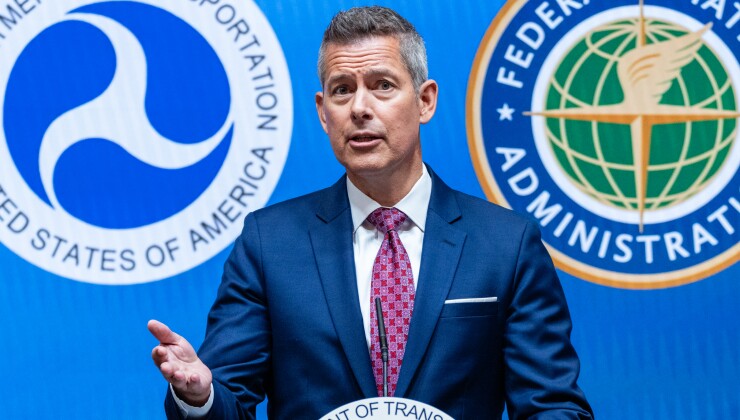
Transportation Secretary Sean Duffy and top federal transportation officials met with state departments of transportation and road builders Thursday to announce the administration's "four pillars" for the next surface transportation bill: enhancing safety, accelerating project delivery, increasing opportunity and partnering with states.
President Donald Trump "wants to see real progress and real projects over the course of the next three and a half years," Duffy said at the press event.
The current transportation law, the Infrastructure Investment and Jobs Act, expires in September 2025. Congressional Republicans have already held a series of hearings on the next bill, which they hope to craft by the end of the year.
The Trump administration is publishing a request for information to seek ideas from states and other stakeholders for the reauthorization, said DOT deputy secretary Steve Bradbury.
"It's really a back-to-basics approach on traditional surface transportation reauthorization," said Bradbury. "That means we really want to fund those projects that are important for our nation, for our economy and that have national importance, and we don't want to see distracting social justice requirements in there," he said, referring to the Biden administration's criteria for discretionary grant programs in the IIJA.
"We want to give state DOTs greater flexibility, reduce the number of programs and strings and conditions on the money that you administer," Bradbury said. In announcing the RFI, Bradbury said the administration "wants to be a clearinghouse for your ideas."
The IIJA featured dozens of discretionary grant programs to fund transportation projects, which marked a major policy shift that
The press conference came the day after Duffy testified before the House Committee on Transportation and Infrastructure during a sometimes combative five-hour hearing.
Duffy fielded questions on everything from a national infrastructure bank to congestion pricing to the administration's progress in
The DOT has approved more than 1,900 of the 3,200 grants under review in January with the remaining 1,300 expected to be cleared by late summer or early fall, Duffy told lawmakers.
"I know how important these projects are," Duffy said, adding, he expects the DOT to advance all but a small number of them.
The DOT is revamping criteria for the grants to adhere to the Trump administration's priorities. "I'm pulling out a lot of the green and social justice out of the [notice of funding opportunities] that were required by the last administration, but the Congress did not require," Duffy said.
The DOT also expects to soon release revised guidance for the IIJA's $7.5
"If you're going to spend money on chargers, let's build chargers," Duffy told lawmakers. "The new guidance is going to give far more flexibility to your states, I think you'll be happy," he said, noting that President Trump has said he would like to terminate the NEVI program, which may still happen.
House Democrats questioned Duffy on the
"Delaying grants authorized in statute, or conditioning transportation funding on things that have nothing to do with transportation, won't get us to yes [on the next surface transportation bill]," said Ranking Member Rick Larsen, D-Wash. "So far, this administration has played a little fast and loose with the division of responsibility between the legislative and executive branches and has given deference to executive orders, even if Congress has already passed a law with a very different idea."
Rep. Dusty Johnson, R-S.D., asked Duffy for his support for a bill he plans to introduce that will block DOT funds for cities that "allow anti-ICE rioters to destroy transportation infrastructure, and then those same local governments will turn around and ask the federal government to foot the bill for the repairs."
Duffy agreed. "If you allow your city to be burned, or even in L.A. where we were allowing rioters to destroy our streets, the federal taxpayer should not come back and then rebuild ... what they allowed to be destroyed," he said.
Duffy said he supported more private investment into U.S. transportation infrastructure following a question from Rep. Daniel Webster, R-Fla. about the creation of a
"There is a role for private capital to come into play, I would agree with that," Duffy responded. "And by the way, a lot of the private capital that I do see coming in is foreign private capital. It'd be great if we saw American private capital, because some of these returns are pretty good," he said. "I'd like to see more American private capital come into the projects where it's appropriate for that private capital to be deployed."
New York Democrat Rep. Jerry Nadler and Duffy had a
Nadler said there was no precedent for repealing the toll program, which charges up to $9 for cars that drive into Manhattan.
"Why don't we fight for the people who can't afford to pay that pricing?" Duffy shot back. "Why shouldn't everyone have access to the city? And if you're going to force people into a subway, make sure it's safe, very simple."





